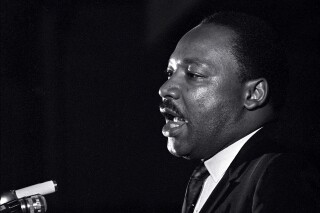Today in History: April 3, Martin Luther King Jr. makes final speech

Dr. Martin Luther King Jr. makes his last public appearance at the Mason Temple in Memphis, Tenn., on April 3, 1968. The following day King was assassinated on his motel balcony. (AP Photo/Charles Kelly)
Today in History:
On April 3, 1968, civil rights leader Martin Luther King Jr. delivered what turned out to be his final speech, telling a rally of striking sanitation workers in Memphis, Tennessee, that “I’ve been to the mountaintop” and “seen the Promised Land. I may not get there with you. But I want you to know tonight that we, as a people, will get to the Promised Land!” (About 20 hours later, King was felled by an assassin’s bullet at the Lorraine Motel.)
On this date:
In 1865, Union forces occupied the Confederate capital of Richmond, Virginia.
In 1882, outlaw Jesse James was shot to death in St. Joseph, Missouri, by Robert Ford, a member of James’ gang.
In 1936, Bruno Hauptmann was electrocuted in Trenton, New Jersey, for the kidnap-murder of 20-month-old Charles Lindbergh Jr.
In 1942, during World War II, Japanese forces began their final assault on Bataan against American and Filipino troops who surrendered six days later; the capitulation was followed by the notorious Bataan Death March.
In 1944, the U.S. Supreme Court, in Smith v. Allwright, struck down a Democratic Party of Texas rule that allowed only white voters to participate in Democratic primaries.
In 1948, President Harry S. Truman signed the Marshall Plan, designed to help European allies rebuild after World War II and resist communism.
In 1973, the first handheld portable telephone was demonstrated for reporters on a New York City street corner as Motorola executive Martin Cooper called Joel S. Engel of Bell Labs.
In 1974, deadly tornadoes began hitting wide parts of the South and Midwest before jumping across the border into Canada; more than 300 fatalities resulted from what became known as the Super Outbreak.
In 1978, at the Academy Awards, Woody Allen’s “Annie Hall” was named best picture of 1977; its co-star, Diane Keaton, won best actress while Richard Dreyfuss was honored as best actor for “The Goodbye Girl.”
In 1996, Unabomber Theodore Kaczynski (kah-ZIHN’-skee) was arrested at his remote Montana cabin.
In 2012, Mitt Romney tightened his grip on the Republican presidential nomination, sweeping primaries in Wisconsin, Maryland and Washington, D.C.
In 2013, Oscar-winning screenwriter and award-winning novelist Ruth Prawer Jhabvala, 85, died in New York.
In 2014, David Letterman announced during a taping of the “Late Show” on CBS that he would retire as host in 2015. (Stephen Colbert (kohl-BEHR’) was named as his replacement a week later.)
In 2017, a divided Senate Judiciary Committee panel voted 11-9 along party lines to favorably recommend Supreme Court nominee Neil Gorsuch to the full Senate.
In 2020, President Donald Trump announced new federal guidelines recommending that Americans wear face coverings when in public to help fight the spread of the coronavirus, but Trump immediately said he had no intention of following that advice himself; he said he could not envision himself covering his face while sitting in the Oval Office greeting world leaders.
In 2022, Ukrainian authorities found bodies with bound hands, close-range gunshot wounds and signs of torture scattered in a city on the outskirts of Kyiv after the withdrawal of Russian troops.
